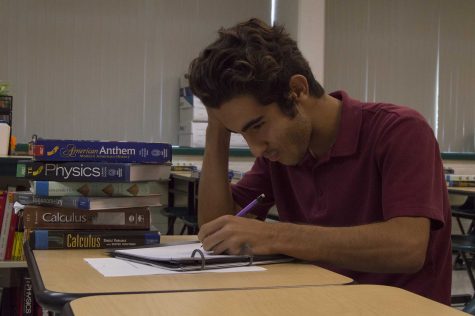EDITORIAL: New SAT brings mixed emotions

College Board headquarters in New York
For years, students and parents alike have been complaining that the SAT does not adequately determine how ready a student is for college. Many have also argued that the SAT plays too large of a role in college admissions. Fortunately, the College Board has finally addressed this issue and has decided to redesign the SAT.
The new SAT is a much better test for measuring students’ potential to do well in college and in their chosen careers. It forces students to apply analytical thinking that they will actually utilize in the future instead of a bunch of test strategies that they will never use again. Another great advantage of this transition is the fact that students will no longer have to spend so much money preparing for the test because free, online practice is offered.
The new SAT will be administered in the spring of 2016. The material on this version of the test will focus more on the concepts students learn every day in the classroom rather than the test strategies that prestigious test prep companies such as the Princeton Review teach their students for quite a bit of money. Students will no longer have to buy expensive test prep books, as the College Board is partnering up with Khan Academy, a website that provides free tutoring online. However, some test prep companies and tutors are now focusing on cracking this revised test. For example, Anthony-James Green, one of the best SAT tutors in New York, according to CNN, charges up to $650 per hour. Now that the test is changing, he is determined to create new tips and tricks for his students, as he claims that those who believe standardized testing is ever fair are simply being ridiculous.
Instead of forcing students to memorize a slew of vocabulary words they will probably never use again, the new SAT will utilize a word choice more relevant to that of which students will actually use in college. The passages and questions on the test will not only incorporate both fiction and nonfiction literature that students should be familiar with when entering college, but also charts, graphs and passages similar to those students will use in the math and social science fields.
The math section is also going to be revised. Instead of straight-forward questions that require either arithmetic or geometry to solve, questions that require more analysis by students will be asked. As a result, students will have to think more about the questions asked instead of simply plugging numbers into a formula they memorized. This way, colleges will know whether students actually understand the more difficult concepts covered on the test rather than simply knowing that the student is a good test taker, which is not the most valuable asset for a college student.
The SAT has never been viewed as a fair test for college admissions. While the test is being changed to test students’ intelligence rather than their test-taking skills, according to US News, the new test could lower the standards of prestigious universities. As a result, the quality of incoming students will deteriorate over time.
The change to the test may also stem from the ongoing battle between the SAT and the ACT. According to US News, since more students chose to take the ACT instead of the SAT, the College Board been trying to make the SAT easier so that it will be more appealing to students. Yet, these changes have been making the SAT more and more like the ACT. This presents a problem: If more students decide to take the SAT over the ACT because of the changes, the ACT may also be forced to create an easier test in order to once again attract more students.
While the current SAT was favored by colleges because it reveals how prepared students are for testing in college, its structure does not give admissions officers any insight as to how intelligent and well-read students actually are. Unlike the skills tested in the current SAT, the skills that the new SAT will test directly correlate with those that will be used by students to do well in college. Thankfully, universities have finally realized that knowledge and a good education are more important than a good test score achieved by memorizing test tactics and techniques.







